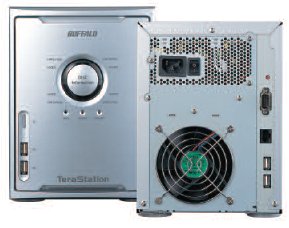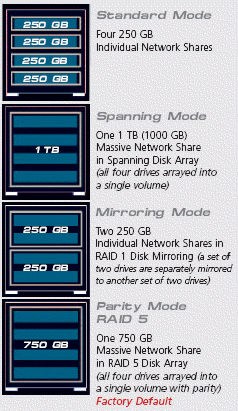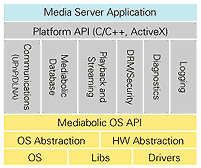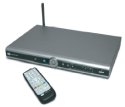Device Profile: Buffalo TeraStation Home Server
Dec 8, 2005 — by LinuxDevices Staff — from the LinuxDevices Archive — 161 views Japanese storage device vendor Buffalo has brought out a “Home Server” version of its NAS server aimed at home users. The “HS” models of its Linux-based TeraServers now include multimedia file management and serving software developed using a Linux SDK from tools and middleware vendor Mediabolic.
Japanese storage device vendor Buffalo has brought out a “Home Server” version of its NAS server aimed at home users. The “HS” models of its Linux-based TeraServers now include multimedia file management and serving software developed using a Linux SDK from tools and middleware vendor Mediabolic.

The TeraStation has high-speed USB and Ethernet ports, along with a serial port for UPS control
The Buffalo TeraStation was originally marketed primarily as a SOHO (small office, home office) NAS server, in the tradition of the ubiquitous Linux-based SnapServer devices. HD-Dxxx TeraStation models have been available in Japan and through Asian resellers such as TigerDirect.com for some time. That device was awarded a “Next Big Thing” award from CNET at last January's CES (consumer electronics show) in Las Vegas, and has since widened its distribution channel to include Fry's, Best Buy, and elsewhere. It generally sells for about $900.
The new HS-Dxxx (“Home Server”) TeraStation models add media server software, and can function as a centralized media repository for multiple PCs and connected entertainment products on home networks, Buffalo says.
 |
config options |
As its name suggests, the TeraStation has a raw capacity of almost one terabyte (1024GB). It comes standard with four 250GB drives, although versions with four 160GB drives, and versions with four 400GB drives are also available.
The TeraStation's drives spin at 7200rpm, and are formatted with an unspecified journaling filesystem and a logical volume management layer. They can be configured to run in JBOD mode (“just a bunch of disks”), or in one of three RAID configurations that provide added performance, fault tolerance, or both (see graphic at right).
The TeraStation offers several high-speed interfaces, including gigabit Ethernet with “Jumbo frame” support, and two front- and two rear-mounted USB 2.0 ports. The USB ports can be used for fast file transers, or to add external drives. They can also be used to attach printers; the TeraStation has a built-in spooling print server.
Other features include a serial port supporting UPS (uninterruptible power supply) control, a web management interface, backup automation utilities, email alarms, removable drive rack for quick disk changes, ultra-quiet fans, status LEDs, and a sleek design.
Mediabolic Media Storage SDK
 |
Media Server SDK |
The newest models of the TeraStation also include multimedia server software built using Mediabolic's NAS Media Server product. Media Server is distributed as a Linux SDK (software development kit) aimed at helping NAS device vendors implement DLNA-compliant multimedia server applications.
 Mediabolic additionally offers a Linux-powered network media player product (pictured at left). Buffalo has also used Mediabolic products to build its DLNA-compliant LinkTheater Mini Network Media Player, which works well in conjunction with the TeraStation, it says.
Mediabolic additionally offers a Linux-powered network media player product (pictured at left). Buffalo has also used Mediabolic products to build its DLNA-compliant LinkTheater Mini Network Media Player, which works well in conjunction with the TeraStation, it says.
Mediabolic originally developed its multimedia server software for Linux in partnership with storage chip and storage appliance vendor IBM. It subsequently partnered with other storage chip vendors, including Toshiba and, more recently, Broadcom. It apparently also supports Freescale PowerPC chips — the TeraStation is based on a Freescale PowerPC processor clocked at 266MHz.
Buffalo COO Kuniaki Saiki said, “The digital home is the next-generation growth market for Buffalo. Mediabolic's well-architected Source Code SDK gave us the ability to build and ship three DLNA-compliant digital media server and player products in less than six months.”
Availability
The TeraStation “HD” and “HS” models are available now, priced at about $900 for versions with a capacity of just under 1TB. The devices measure 6.6 x 8.7 x 9.5 inches, and weigh 16.1 pounds. They come with a Windows-based setup utility.
This article was originally published on LinuxDevices.com and has been donated to the open source community by QuinStreet Inc. Please visit LinuxToday.com for up-to-date news and articles about Linux and open source.